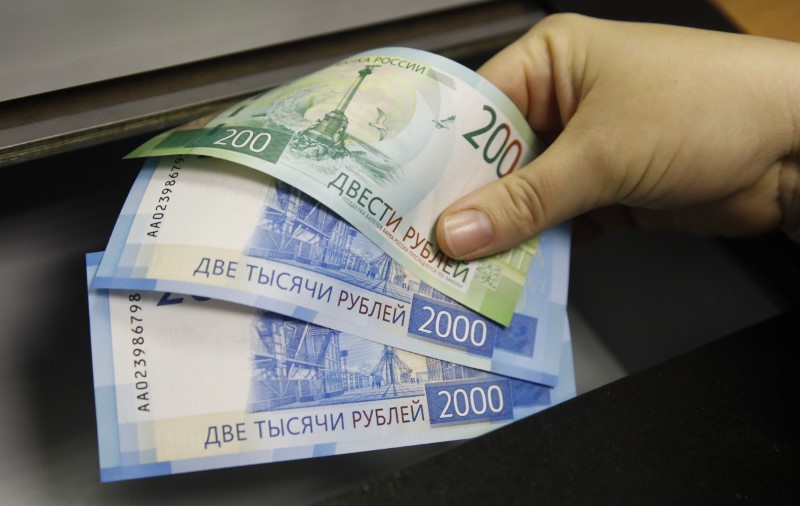By Polina Ivanova
MOSCOW (Reuters) - Russia's ruble suffered its biggest daily fall in over three years on Monday and stocks in major Russian companies also slid, as investors reacted to a new round of U.S. sanctions targeting some of Russia's biggest tycoons.
The sanctions, announced on Friday, target officials and business people around President Vladimir Putin in an aggressive response to alleged Russian meddling in the 2016 U.S. election.
The impact of the new measures could threaten Russia's fragile economic recovery, which was only just beginning to take hold after a wave of sanctions against Russia introduced in response to its annexation of Crimea in 2014.
Russia's currency briefly dipped more than 4 percent before recovering slightly to trade at 60.31 to the dollar at 1512 GMT, down 3.67 percent, its biggest daily percentage fall since January 2015.
Shares in Russia's two biggest banks, Sberbank (MM:SBER) and VTB (MM:VTBR) fell 17.3 and 9.1 percent respectively. State-owned Sberbank is traditionally seen as a barometer for the wider health of the Russian economy.
On equities markets, Russian aluminum tycoon Oleg Deripaska saw the share price of one of his companies halve after he joined six other so-called "oligarchs" sanctioned together with their businesses, as well as 17 political figures.
The dollar-denominated RTS index (IRTS) was down 11.2 percent and the ruble-based MOEX Russian index (IMOEX) fell by 7.7 percent - to their lowest levels since September and November respectively.
Kremlin spokesman Dmitry Peskov said Moscow was watching events on the markets closely but that an assessment of the impact of the sanctions would take time.
"The situation is pretty egregious from the point of view of legality, it tramples on all kinds of norms, and so a thorough analysis is necessary," Peskov said.
ALL EYES ON ALUMINUM
United Company Rusal Plc (HK:0486), at the heart of Deripaska's global aluminum empire, saw the price of its shares listed in Hong Kong fall over 50 percent.
Rusal said in a statement that the impact of sanctions could trigger technical defaults on some of its debts. Its dollar-denominated bonds fell hard on default fears, while its Moscow-listed shares (MM:RUAL) tumbled 27.7 percent.
"Rusal will probably have to be bailed out by Russian state banks," analysts at TS Lombard wrote, adding that Deripaska may also be forced to sell his stake in Norilsk Nickel (MM:GMKN), losing a drawn-out battle with Vladimir Potanin for control of the metals giant.
Three private jets that are linked to Deripaska's family, according to Russian media reports, have returned to Moscow in the past few days, flight tracking services showed.
TROUBLE AT HOME
The sanctions mean Russian companies face the prospect of losing access to the U.S. market, which accounted for around 14 percent of Rusal's revenue last year, according to analysts at Promsvyazbank.
But Russian firms could also run into trouble in other markets as investment partners pull out to reduce exposure.
The Swiss engineering company Sulzer (S:SUN) decided to buy back 5 million of its own shares from Renova Group at an emergency board meeting on Sunday, to reduce Renova's holding to below 49 percent. Viktor Vekselberg, Renova's Russian chairman, was included on the sanctions list on Friday.
Though Russian gas giant Gazprom (MM:GAZP) was not sanctioned, Alexei Miller, its chief executive, was included on the U.S. list. That could create complicated legal dilemmas for Gazprom's many foreign partner companies.
Most are under EU jurisdiction, but they will not want to fall foul of U.S. legislation either.
Russian Prime Minister Dmitry Medvedev on Monday ordered his government to prepare measures to support sanctioned Russian entities and to draw up possible retaliatory steps.
However, Russia may find it difficult to respond in kind by imposing sanctions on U.S. businesses since few of them have significant Russian exposure.
Russian companies not under sanctions are also taking a hit. Steel miner Evraz (L:EVRE) was the biggest faller on the FTSE 100 on Monday, down 8 percent, while gold producer Polyus saw its 2023 dollar bond issue plumbing a record low.
Russia's sovereign dollar bonds fell across the curve, with its September 2043 eurobond

The cost of insuring exposure to Russian debt also rose on Monday to its highest since mid-December, IHS Markit data showed.